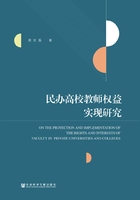
ABSTRACT
Teachers are the foundation and wellhead of education,as well as the ultimate source of the developing of private education. Currently,Chinese private higher education is going through the transition in which the development of private universities and colleges is getting rid of over-reliance on student source and puts greater emphasis on the cultivation of teachers. The cultivation of teachers becomes the focus in present stage. Whether the rights and interests of faculty can be guaranteed will have a direct effect on the sustainable development of private higher education.
Based on the organization equilibrium theory,stakeholder theory and principle-agent theory,the book selected 1027 full-time teachers from 7 private universities or colleges in Beijing,Shandong,Zhejiang,Henan,and Ningxia as the subjects,and questionnaires and interviews were conducted. Findings and conclusions of empirical researches were revealed and feasible strategies were proposed to promote the rights and interests of faculty in private universities and colleges.
Chapter One is Introduction. By tracing back the background,current status,regulations and policies of private higher education and its teachers,this study recognizes the importance and necessity of the rights and interests of faculty in private universities or colleges. After a comprehensive review of research findings at home and abroad,research questions are clarified,and research approaches and techniques are developed.
Chapter Two is Theoretical Foundations. It defines key concepts,briefly introduces the evolution and main ideas of organization equilibrium theory,stakeholder theory and principle-agent theory to provide the basis of theoretical framework of this study.
Chapter Three is Empirical Analysis. The design of questionnaires and the implementation of surveys are presented. Data analysis shows that rights and interests of faculty in private universities or colleges are not sufficiently actualized,which mainly reflects in following aspects:ambiguous identity and lower social status;unsatisfactory salaries and social insurance;obstacles in professional title evaluation and employment;and limited participation in colleges’ democratic management. Multivariate regression model is exploited to show that the faculty have comparatively weaker influence on achieving their own legitimate rights and interests.
Chapter Four to Seven are Subjects Analysis,based on interview materials and local situations. The underlying reasons of faculty’s identity,salaries and social insurance,professional title evaluation,and participation in democratic management are elaborated,the current policy trends are analyzed and some practicable solutions are proposed. Several factors lead to the ambiguous identities and lower status of faculty members in private universities or colleges,such as unclear legal person identity of private universities or colleges,different education levels of different schools,regional disparity of relative polices. In view of this,to make clear private higher education institutions’ legal identity,to encourage local governments to make breakthrough,and to promote a consensus among multi-stakeholders should be the overall path to enhance the status of faculty in private universities or colleges. Several factors lead to the current challenge in the aspect of salaries,benefits and job security,such as irrational system of salaries and remuneration,diversified goals of school-running,dual system of social security for the public sector and the private one,and insufficient support from public finance. In view of this,to give full play to the roles of the government and the sponsors,to establish the cost-share mechanism,to reform on the dual system of public vs private colleges should be the future directions. Several factors lead to the current difficulties in professional titles evaluation and promotion,such as the sole evaluation system,limited professional development and disparities of regional polices. In view of this,unified management of professional titles evaluation and rank promotion,flexible evaluation standards in accordance with the characteristics of faculty in private institutions,and more opportunities for professional development should be the strategies. Also,several factors lead to the current weak role of faculty in school democracy and management,such as the defective mechanism of democracy in school management,managers’ illogical theory of school running,and unsound internal management system. In view of this,to improve internal governance structure and to enhance the mechanism of democratic participation should be the future focus.
Chapter Eight is Suggestions. To solve the problems exposed by the research,from the perspectives of common interests of multi-stakeholders,general ideas and corresponding approaches of protecting and realizing the rights and interests of faculty staff are proposed. First,create better legal environment by improving the legal and regulation system of private higher education to ensure that relevant polices could be put into action. Second,design the differential systems of management and treatment and promote the co-governance system with cooperative efforts from different parties. Third,stress the governmental roles of regulation and macro-control by performing certain governmental functions fully and properly,encourage private universities to take their responsibility to protect and promote teachers’ rights and interests,and make sure that organizations play roles in providing professional services to help achieve teachers’ rights and interests.
The last part is Conclusion. Main findings are summarized and refined,the research process is recapitulated,the innovation and weaknesses of the research are revealed and the focuses of possible researches in the future are expanded.